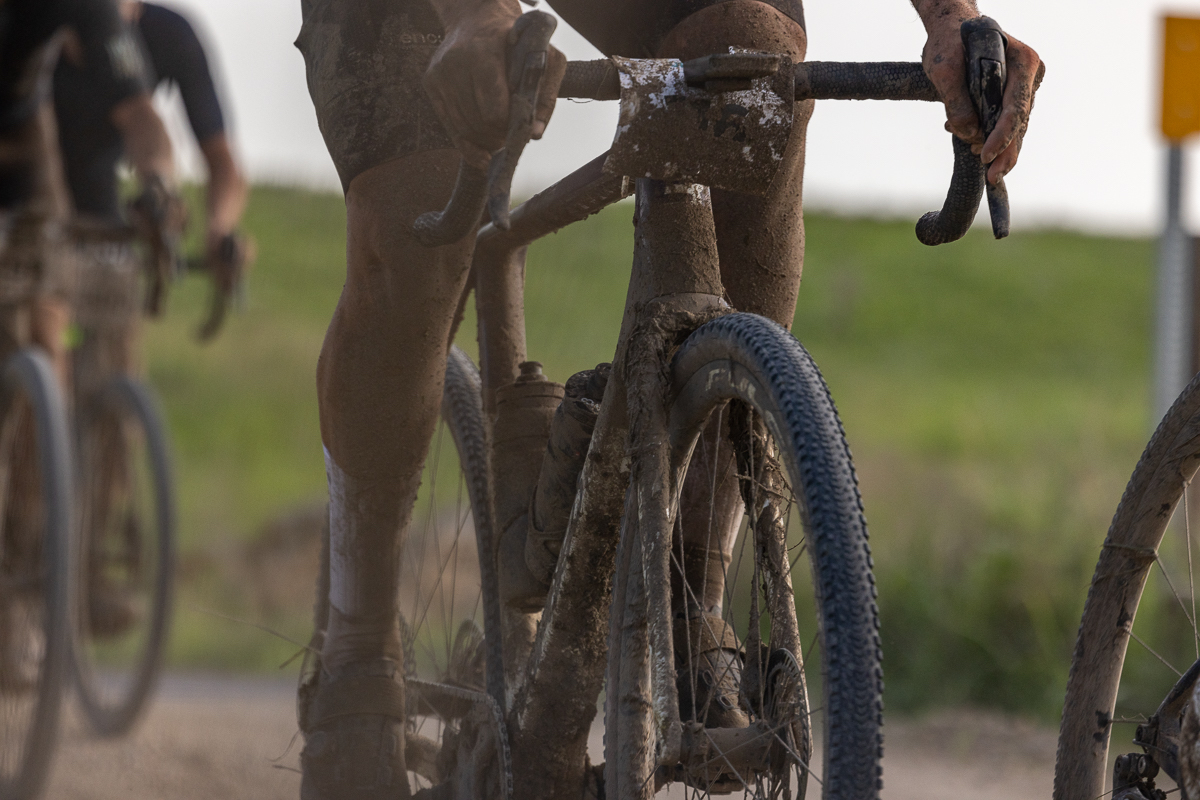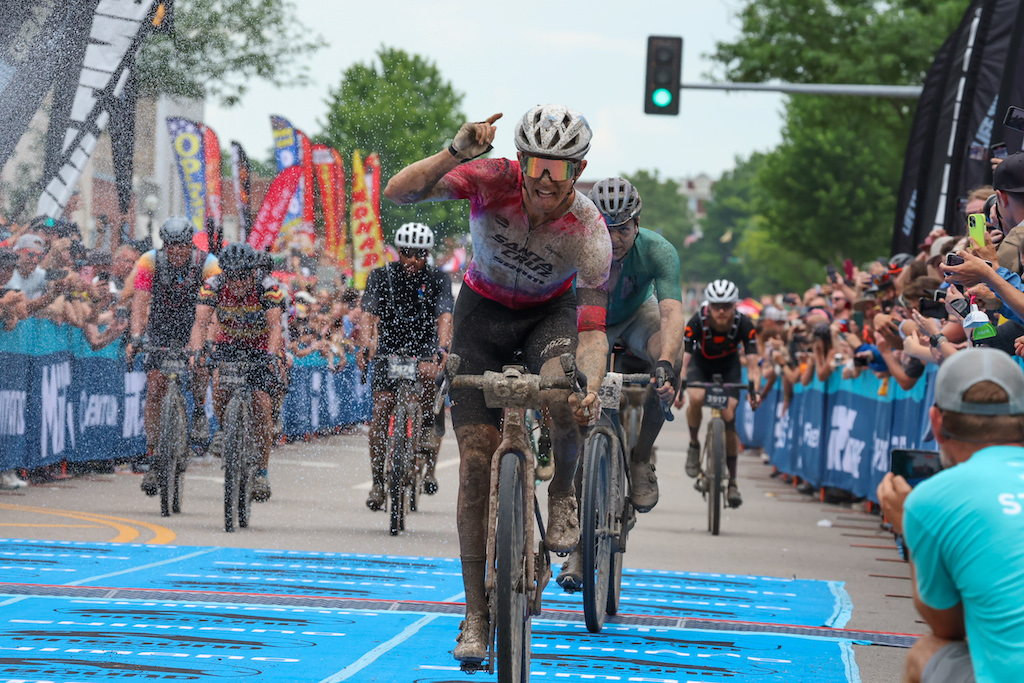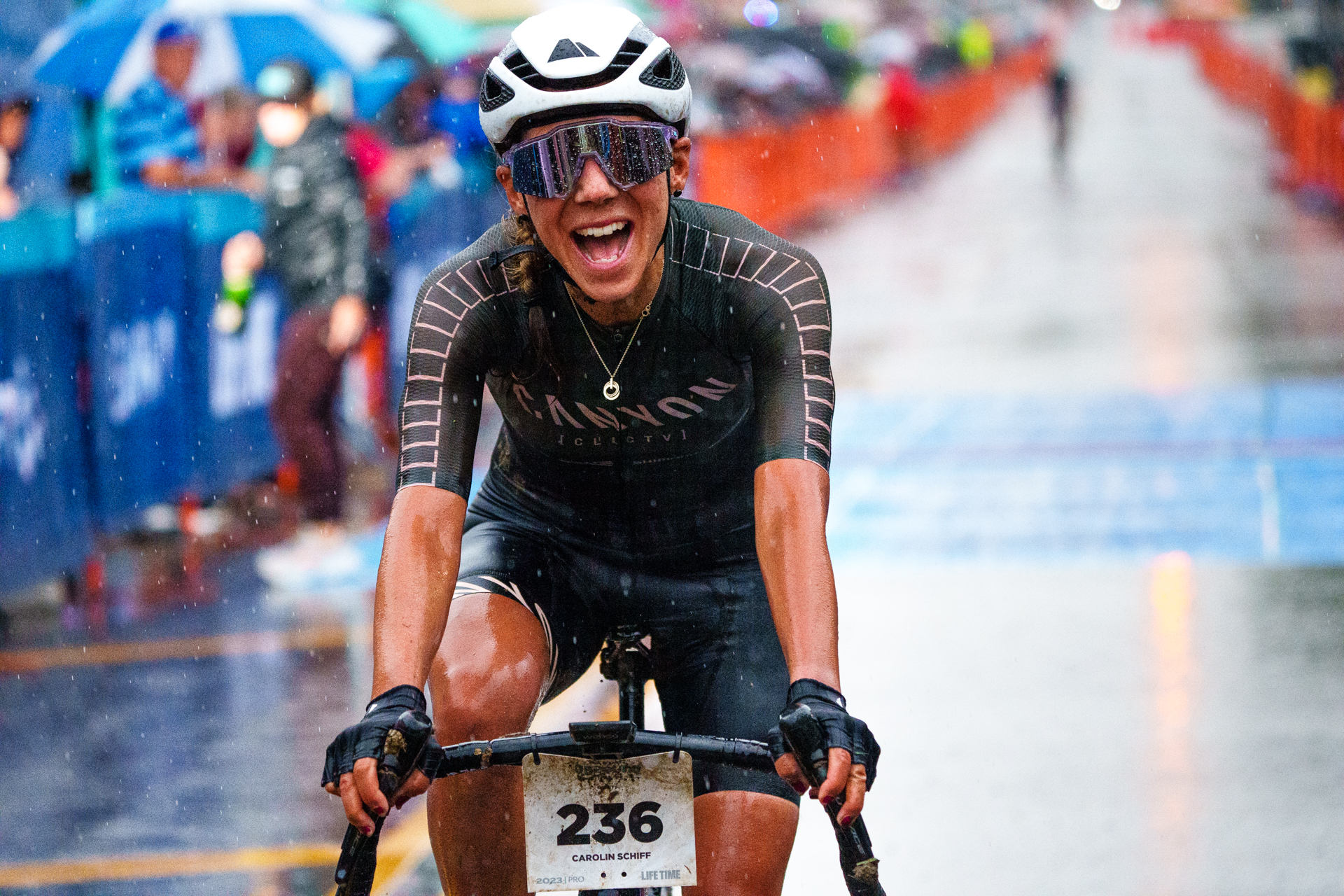
The words elite riders used to describe the 2023 Unbound Gravel had a similar ring: mayhem, brutal, unforgiving, survival, wild. The consistent theme from the pros, and many amateurs, was '205 miles of pain' for the flagship event.
Last year’s runner-up Keegan Swenson won the men’s elite division in a seven-rider rush to the finish in Emporia, while Carolin Schiff won the women's title with a 15-minute margin over last year's champion Sofia Gomez Villafañe.
What began as a muddy patch just beyond mile 10 became a horrific mess as thousands, not hundreds, of riders passed over the same section, known as D Hill. The procession of riders became a painful parade in heavy mud and wet grass and more than two miles uphill.
Few could ride the section, with the exception some of the elite men at the front who got a two-minute start on the elite women and a 10-minute advantage on the mass of amateurs. Many suffered race-delaying or race-ending mechanical issues, and a beat-down to physical fortitude, because of the muck and madness.
While most of the attention on social media provided intermittent play-by-play on the Unbound 200, the Unbound 100 was just as challenging. David Brower won the men’s 100-mile race in a sprint on Saturday and Tiffany Cromwell rode solo across the line for the elite women's title.
In the XL 350 (yes, 350 miles), 47 out of 71 riders finished with official times, six of them women. Logan Kasper of Massachusetts won for the men in a time of 22:54:25 and Kristen Legan of Colorado won for the women, 26:06:35.
Cyclingnews picked the five major talking points from Unbound Gravel.
For the pros or the masses?
Unbound Gravel now draws professional riders from around the world who seek a prestigious win at the pinnacle event of gravel racing. The reality is that while the elite men and women may draw the lion's share of the attention, they are just a fraction of the 4,000-strong competitors in Kansas.
Combining the top riders in the world race with well-conditioned amateurs and weekend warriors - all on the same course - has become part of the lore and legend of Unbound, as it captures the imagination of the growing legion of gravel devotees.
"This race is very special. It caters to amateurs, not just professionals," 2021 winner Ian Boswell said after his ride, rolling in fifth in a seven-rider sprint finish. "I came to this sport because it was different than road racing. Today was the most fun I have had on a long ride. It was like a group ride. This sport is unique. I want to keep it that way."
Boswell was part of a group of seven elite men who were jockeying for position on the narrow run into the finish line on Commercial Street in downtown Emporia. Among them dozens of amateurs also populated the same straightaway to complete their distances of 50 and 100 miles, though they hardly stopped the elite men's sprint finish won by Keegan Swenson.
The elite women started coming to the line of their 205-mile race 90 minutes later and had to battle through a heavier contingency of amateurs. Was this an interference, or just another integral part of the predictably unpredictable nature of gravel racing which makes it so special?
Former road pro turned alternative racer Lachlan Morton, who finished third in the high-stakes elite competition, agreed with Boswell that the 'spirit of gravel' was to allow amateurs to match skills on not only the same course as the pros, but in the same event as the pros. That is unique to gravel.
"Realistically you are also catering to people who are out having a good day on a bike, catering to amateurs. This race is not 'professional',” said Morton. “There are a lot of things you could do to make it a professional race, yes, but then you can go do UCI Gravel World [Championships]. This race is very special and maybe involves some things that are an inconvenience other than going as fast as possible."
Unbound Gravel's marketing manager Kristi Mohn summed it up: “The emphasis is on the journey-person athlete. That’s the spirit of gravel.”
Muddy section should have been rerouted
Mud. That is what the chunky, flint-strewn, rustic roads across eastern Kansas presented for the 17th edition of the Unbound Gravel 200 event. And mud is what all of the 4,000-plus registered riders, the largest field size across five distances in the event’s history, found to be a game changer.
In fact, the official press release to confirm the winners noted that the opening 10 to 13 miles of the Unbound 200 race was significant because "some riders’ suffered race-delaying or race-ending mechanical issues because of the mud".
Unbound is always difficult, due to its distance, razor-sharp rocks, rolling terrain, gauging nutrition for the endurance event and providing self support through the Flint Hills of Kansas.
But this year it seemed to be the heavy, sticky mud just 10 miles into Unbound 200 that disrupted opportunities for the elite riders to form front groups and the amateurs to enjoy the experience.
The 'D Hill' area was removed from the route after 2015 when it became a mud pit because of heavy rain. Race organisers had mentioned on Friday that they might re-route the 200-milers because the area had already taken on lots of rain during the week. It rained again Friday night, but no re-route was made, and riders in all categories suffered the consequences.
"Let's do that again!! (Maybe never)," was a note made by women's elite sixth-place finisher Rebecca Fahringer. That sentiment was echoed in the social chatter by all riders.
If the section already had a history of creating havoc, organisers should have followed through on the already known re-route.
More rules changes?

This year Unbound Gravel enforced several rules changes for the elite fields in the 200-mile even for safety reasons. Aerobars or bar extension were no longer allowed, and the elite fields had separate start times from the mass of amateur riders. The elite men started at 6:50 a.m., with the elite women two minutes later and then the balance of riders, 1,154 amateurs, at 7 a.m.
Women's elite runner-up and former winner Sofia Gomez Villafañe didn't give Life Time high marks for the plan, explaining that a large set of the amateurs caught the back of the women's elite field by mile 10, which is where heavy mud and a long climb created chaos. She said she was frustrated with that situation because "there was a backup that was not used. A lot of people's races were kind of over in the first hour of the race".
"Unbound is this hot race, the level of professionalism should be higher," she said and chimed in about several other issues at this year's event that she felt needed regulations.
"We want course markings. We [elite women] pass so many people in the 100. I'm definitely ready to have a women's-only race for sure. It is time for us to start pushing for changes."
The finish became tricky because there was no room for a four-wide sprint, especially as a seven-rider men's sprint mixed with amateurs from another division, just looking to finish.
Second-placed in the elite men's 200, Peter Vakoč, who competed for eight years in WorldTour races, indicated that a separate and clear corridor to the finish line for pros could lead to more interesting finishes.
"Riders from the 100-mile event put in an extra twist [in the finish]. A clear corridor fo the pros next time, maybe. In the end it is getting more professional and important for brands and sponsors. A space for an elite finish would make it safer and more interesting for next year."
Unbound has gone global

Last year when Dutch rider Ivar Slik and Argentinian Sofía Gómez Villafañe crossed the line first in the men's and women's Unbound 200 categories, respectively, it was a clear message that this was no longer a race controlled by the US gravel specialists.
The growing attention for the race and the discipline from riders from around the globe had taken hold, and no longer could the North American contingency flex their local knowledge and lack of jetlag to keep the international set to the back of the pack.
Perhaps emboldened by the 2022 results, there were plenty of new challengers flocking to Emporia from outside North America. They included South African mountain biker Matt Beers, Australian Gravel Champion Brendan Johnston, UCI Gravel World Series round winners Paul Voss, British women's gravel champion Danni Shrosbree, Dutch rider Tessa Neefjes, German Carolin Schiff, Australians Justine Barrow, Adam Blazevic and Tasman Nankervis along with former road pros Petr Vakoč of the Czech Republic and Belgian Jan Bakelants.
It may not have been the easiest of introductions for many, with the thick, sticky mud in the early section of the race destroying many hopes of a dream debut, but two riders in particular made a first entry at the race that will continue to serve as a reminder not to discount the international arrivals. They were, of course, the women's winner Schiff and Vakoč, who came second behind Keegan Swenson.
Mud made Unbound a test of mental strength
Briton Danni Shrosbree and New Englander Sarah Lange not only survived Unbound Gravel 200 but they cast a silver lining on an elite women’s race that otherwise finished under dark clouds of rain and negative feedback.
Both are newcomers to the big stage of gravel racing and they not only showed strength in physical and mental endurance in the difficult, muddy conditions across 205 miles of the Flint HIlls of Kansas, they showed class.
Two years ago in the road race at British National Championships, Shrosbree finished eighth and earned a contract on a continental-level team. Last year she won the 2022 British Gravel championship at the King’s Cup. Now 28 and riding for the DAS - Handsling conti-level programme, she was accepted to be part of the Life Time Grand Prix field, and made her way to her first Unbound Gravel.
“What have I gotten myself into? I just put my head down. It was savage,” Shrosbree told Cyclingnews in Emporia, where she finished fourth in the elite women’s race, and third among the Grand Prix competitors.
Later she called the event “the toughest day mentally on a bike I have ever had”, but was all smiles at a post-race press conference.
Lange, who won 2022 Vermont Overland and 2023 Gravista in Virginia, made Unbound her first big gravel race east of the Mississippi river. The 31-year-old said after the race she was proud of her performance, even though she faded to fifth.
“In the last checkpoint I felt really good, then at mile 170 there was more mud. It took the wind out of my sails.”







